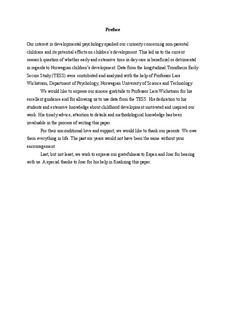| dc.description.abstract | Early and extensive day care has become increasingly common in western countries.
Studies investigating the potential short-term impact of such experiences on children’s development have yielded mixed results, whereas long-term effects have been understudied. In this study we therefore examine the impact of early and extensive day care on children’s emotional, behavioural, relational and cognitive functioning during preschool and the first three years of school. 878 children drawn from the longitudinal Trondheim Early Secure Study (TESS) participated in the current study. The sample was representative of Norwegian four, six and eight yearolds.
Results showed apparent effects of early extensive childcare on several areas of children´s life. When results were adjusted by controlling for selection factors and correction for number of variables, almost all of the effects disappeared. This indicates that the long-term effects of time spent in non-parental childcare on children’s development are limited, at least up to age eight | nb_NO |
